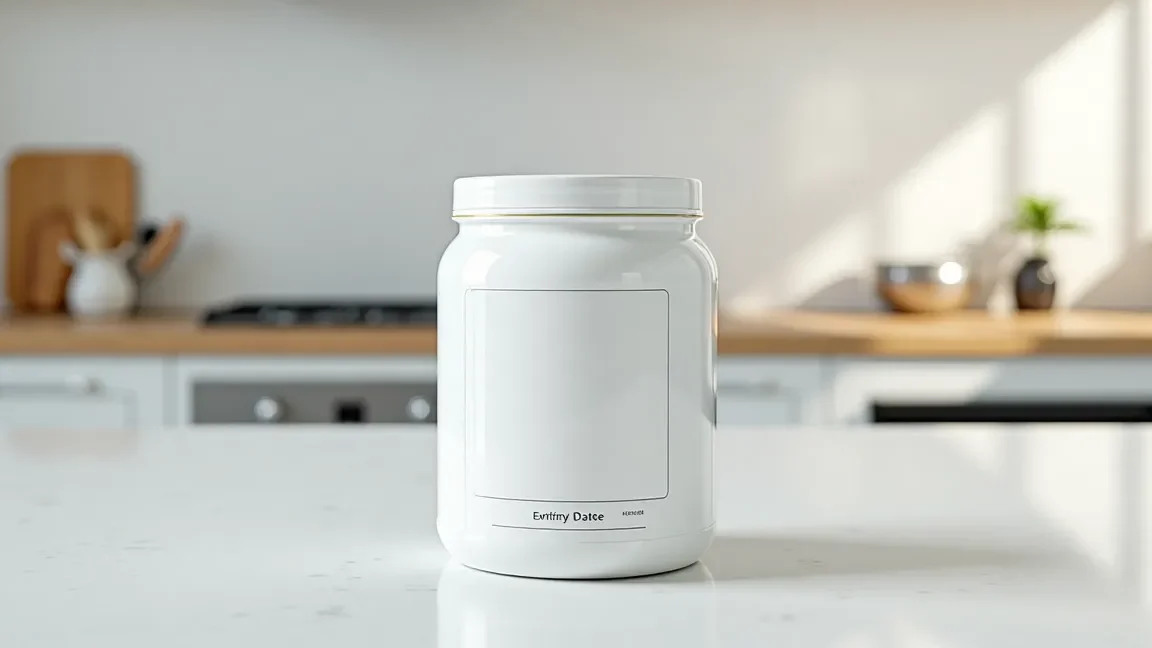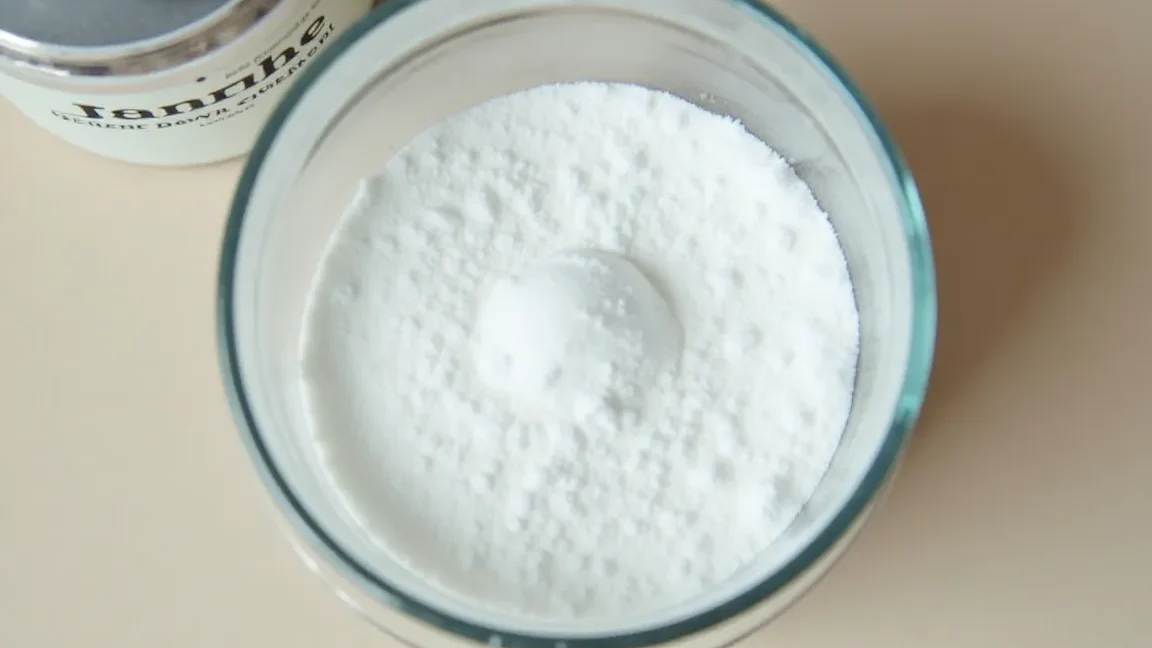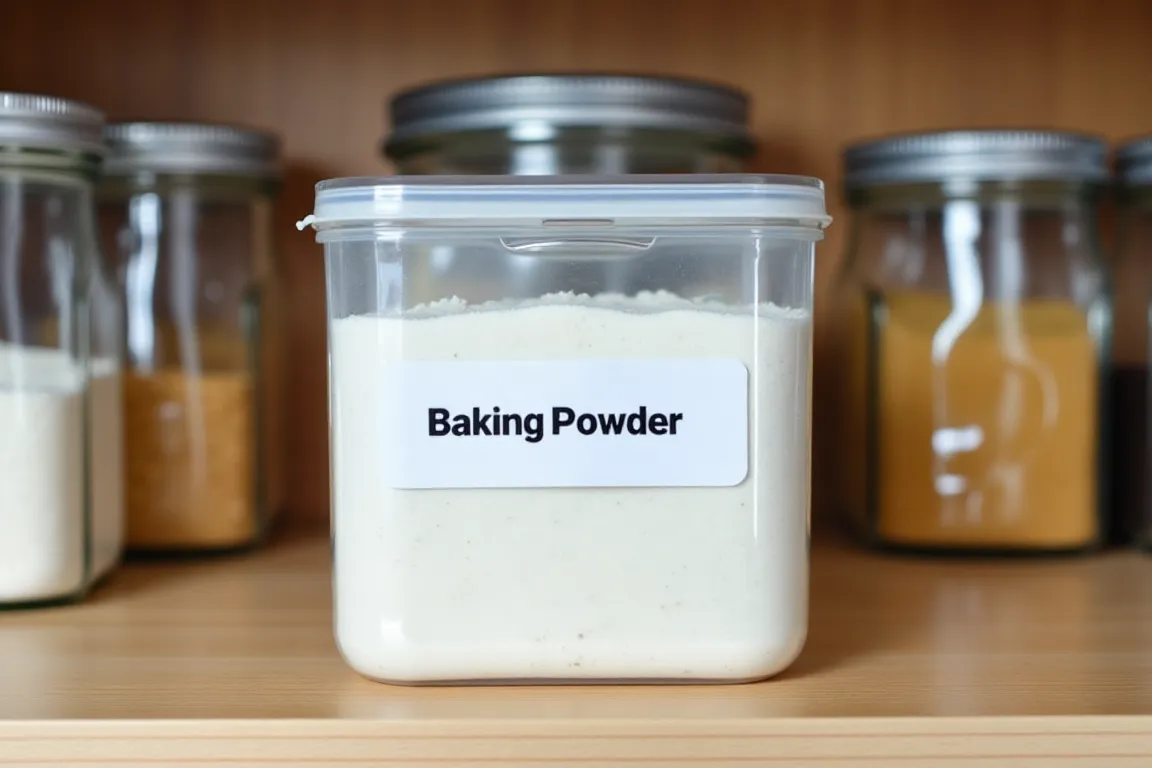This guide explains whether Can I use expired baking powder and what happens if you do. We’ll also cover how to tell if baking powder is bad, what it does in baking, and safe ways to use it or replace it.
Table of Contents
Understanding Baking Powder
What Baking Powder Does
Baking powder makes baked goods rise. It contains baking soda and an acid. These ingredients work together to create tiny bubbles of gas. The gas expands when heated, making your cakes, muffins, and cookies fluffy.
Types of Baking Powder
There are two main types: single-acting and double-acting. Single-acting baking powder releases gas only when it gets wet. Double-acting baking powder is more common. It releases gas in two steps: once when you mix it with wet ingredients and again when you bake it in the oven. This two-step process gives baked goods a better rise.
Baking Powder Ingredients
Baking powder usually includes baking soda and an acid, such as cream of tartar. The acid reacts with baking soda to produce carbon dioxide gas, increasing the baked goods.

How to Tell if Baking Powder is Expired
First, check the date printed on the baking powder container. This tells you when the company recommends using it.
Mix one teaspoon of baking powder with one-third of a cup of hot water to test it yourself. Observe. If it fizzes a lot, your baking powder is still good.
If it fizzes only a little, it’s getting weak. It might still work, but your baked goods might not rise as much.
Does it not fizz at all? It’s time to buy a new can. Expired baking powder will not make your treats rise properly.
The Risks of Using Expired Baking Powder
Flat Baked Goods
Expired baking powder might not make your baked goods rise. Cakes, muffins, and cookies might be flat or dense because the baking powder loses its ability to create the gas needed for rising.
Taste and Texture
Even if your baked goods rise slightly, they might not taste as good. Expired baking powder can change the flavor of your treats. The texture might also be off, feeling less fluffy or light.
Is it Dangerous?
Using expired baking powder won’t make you sick. It’s not harmful but won’t give you the desired results. Using fresh baking powder for the best taste and texture is better.
| Ingredients | Quantity | Note |
|---|---|---|
| Baking Powder | 1 teaspoon | For the test |
| Hot Water | 1/3 cup | For the test |

Storing Baking Powder Properly
Keeping Baking Powder Fresh
Store baking powder in an airtight container. This keeps air and moisture out. Moisture is baking powder’s biggest enemy. It weakens the powder, making it less effective.
The Best Storage Place
A cool, dry place is ideal. Avoid storing it near a stove or other heat sources. Heat can also damage baking powder, reducing its ability to raise your baked goods. A pantry or cupboard away from heat and moisture is perfect.
Signs of Bad Baking Powder
If your baking powder is lumpy or smells different, it’s probably time to get a new container. These are signs that the powder has absorbed moisture and lost its effectiveness. Always check the expiration date as well.
Troubleshooting Baking Problems
Baked Goods Won’t Rise?
If your cakes, muffins, or cookies are flat, old baking powder might be the problem. Baking powder helps baked goods rise by creating gas bubbles when heated, but old baking powder loses this ability.
Testing Your Baking Powder
Mix one teaspoon with one-third cup of hot water to check if your baking powder is still good. If there is a lot of fizzing, it means it’s fine. Little or no fizzing means it’s time for a new can.
Using Fresh Baking Powder
Using fresh baking powder is essential. It ensures your baked goods rise correctly and taste their best. Always confirm when the date of expiration is on the bottle. Follow your recipe carefully, measuring ingredients accurately. Fresh baking powder and careful measuring are key to baking success.
Replacing Baking Powder
Finding Substitutes
If your baking powder is expired, don’t worry! You can often replace it. For every teaspoon of baking powder, you can use a combination of ¼ teaspoon of baking soda and ½ teaspoon of cream of tartar. This mixture mimics baking powder’s action. Remember, this substitute works best in recipes with an acidic ingredient, like buttermilk or lemon juice. For more alternatives, check out this guide on baking powder replacements.
Baking Soda Only?
Using baking soda alone isn’t a perfect replacement. Baking soda needs an acid to create the gas that makes baked goods rise. If your recipe lacks an acid, the baking soda won’t work properly, and your baked goods will be flat.
When to Replace
Use the baking powder test to check if it’s still good. If it fails, use a substitute or buy a new container. Fresh baking powder always ensures the best results. Don’t risk flat or poorly tasting treats!
Frequently Asked Questions
How long does baking powder last?
The expiration date on the container is the best guide. However, you can test it by mixing a teaspoon with a third cup of hot water. Lots of fizz means it’s good; little or none means it’s time for a new can.
What happens if I use expired baking powder?
Your baked goods might not rise properly, resulting in flat cakes or muffins. The taste and texture might also be affected. However, it’s not harmful to eat.
Can I substitute baking powder?
Yes. You can replace one teaspoon of baking powder with ¼ teaspoon of baking soda and ½ teaspoon of cream of tartar. This works best in recipes that already have an acidic ingredient; using baking soda alone won’t work without an acid.
Why is my baking powder lumpy?
Lumps usually mean your baking powder has absorbed moisture. Moisture weakens baking powder, making it less effective. Keep the item in a sealed jar in an area that is cool and dry.
My baking powder doesn’t fizz in the test. What should I do?
If your baking powder fails the fizz test, it is best to replace it with fresh baking powder. Using old baking powder can result in flat and less tasty baked goods.
Why are my baked goods flat?
Several things can cause flat baked goods, including old baking powder. Check the expiration date and do the fizz test. Make sure you’re following the recipe correctly and using fresh ingredients.
Can you safely use baking powder beyond the expiration date?
Using expired baking powder won’t make you sick, but it will likely affect the rise and taste of your baked goods. For optimal results, it’s best to use fresh baking powder.
Conclusion
Testing Your Baking Powder’s Freshness
You already know how to test baking powder: Mix a teaspoon with a third cup of hot water. Lots of bubbles mean it’s good. Few or no bubbles mean it’s time for a new container.
Understanding Expiration Dates
Always check the date on the container. This date gives you the best-by time set by the maker. Even if it passes the fizz test, old baking powder might not work perfectly.
Making Substitutions
Need a replacement? Mix ¼ teaspoons of baking soda with ½ teaspoon of cream of tartar for every teaspoon of baking powder. This works well in recipes with acidic ingredients, like lemon juice or vinegar. But using only baking soda won’t work without an acid.
Using Fresh Baking Powder for Best Results
Using fresh baking powder gives your treats the best rise and taste. Baking is a science; fresh ingredients are essential for the best results. Accurate measuring also helps.
Check expiration dates and test your baking powder. Use substitutes or fresh baking powder for best results.
